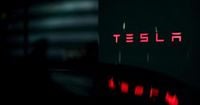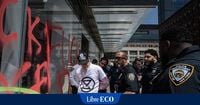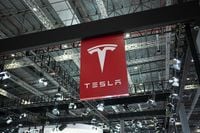Tesla Inc. reported disappointing first-quarter results on April 22, 2025, revealing challenges that have impacted its performance and raised concerns among investors. The electric vehicle (EV) manufacturer, led by CEO Elon Musk, reported a profit margin of 12.5%, surpassing the consensus estimate of 11.8% according to Visible Alpha data. However, the company’s quarterly revenue of $19.33 billion fell short of analysts' expectations, which had averaged $21.13 billion. This revenue represented a 9% decline year-over-year, and net profit plummeted by 71% to $409 million, translating to earnings of 27 cents per share, down from 45 cents a year earlier.
The decline in sales has been particularly stark, with Tesla delivering only 336,681 vehicles in the first quarter, marking a 13% drop compared to the same period last year. This decrease is notable as it represents the first decline in deliveries in over a decade, according to Briefing.com. Analysts had expected deliveries to exceed 400,000 units at the start of the year, with firms like Wedbush projecting between 355,000 and 360,000 units. Deutsche Bank had also revised its estimates downward to between 340,000 and 350,000.
In a statement, Tesla acknowledged that "uncertainty in the automotive and energy markets continues to rise" due to rapidly changing trade policies affecting global supply chains and cost structures. The company warned that these dynamics, along with shifting political sensitivities, could significantly impact demand for its products in the short term.
Elon Musk's close ties to the Trump administration have come under scrutiny, especially as the company faces backlash in the form of vandalism, calls for boycotts, and protests in the U.S. and other countries. Critics argue that Musk's political engagements have diverted his focus from Tesla's core business, potentially jeopardizing the company's reputation and sales.
Despite these challenges, Tesla remains committed to its future plans. The company confirmed that its projects for new models, including a lower-cost vehicle, are still on track for production in the first half of 2025. Additionally, Tesla is preparing for the large-scale production of its robotaxi, an entirely autonomous electric vehicle that was unveiled on October 10, 2024. The robotaxi is expected to hit the streets of Austin, Texas, starting in June 2025, with production slated to begin in early 2026.
However, analysts are cautious about the company's trajectory. "Musk is in an extreme emergency situation," remarked analysts from Wedbush, emphasizing that each time he has faced adversity, he has managed to reinvigorate Tesla's narrative. The upcoming earnings call is viewed as a pivotal moment for the company, with analysts keen to hear whether Musk will prioritize Tesla over his political endeavors.
As Tesla navigates these turbulent waters, competition is intensifying. In 2024, Tesla sold 1.79 million electric vehicles, while rival BYD sold 1.76 million, marking a 12% increase for BYD year-over-year. This growing competition, particularly in key markets like the U.S. and China, has been eating into Tesla's market share.
The company's stock has also taken a hit, with shares dropping more than 40% since the beginning of the year. This decline has prompted treasurers from eight U.S. states to send an open letter to Tesla's chairwoman, Robyn Denholm, expressing concerns about the company's governance and leadership. They warned that unresolved issues could have serious consequences for Tesla and its stakeholders.
Looking ahead, analysts expect Tesla to face a second consecutive annual decline in deliveries in 2025, despite efforts to boost sales through incentives such as free charging and fully autonomous driving features. The company abandoned its plan to launch a new low-cost model last year, opting instead to produce more affordable variants of existing models using current platforms and production lines.
As Tesla grapples with these challenges, the company’s future will hinge on its ability to adapt to a rapidly changing market landscape and address the concerns of both investors and consumers. With the backdrop of a contentious political climate and evolving consumer preferences, Tesla's leadership will need to navigate carefully to restore confidence in the brand and its products.



